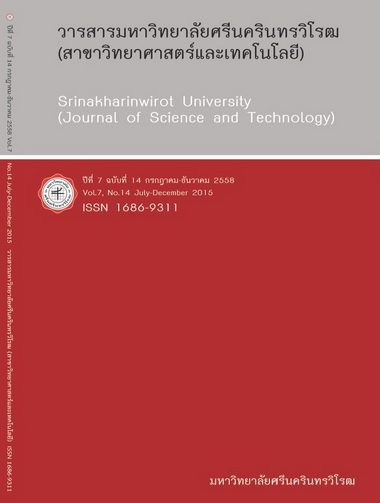การปรับปรุงสมบัติการละลายของท่อนาโนคาร์บอน (THE IMPROVEMENT OF SOLUBILITY PROPERTIES OF CARBON NANOTUBES)
Abstract
ท่อนาโนคาร์บอนเป็นวัสดุที่กำลังได้รับความสนใจเนื่องจากคุณสมบัติเฉพาะตัวที่ดีเยี่ยม ได้แก่ คุณสมบัติเชิงกล ความร้อน เคมี และทางไฟฟ้า แต่เนื่องจากท่อนาโนคาร์บอนไม่ละลายทั้งในน้ำและตัวทำละลายอินทรีย์ รวมถึงมีการกระจายตัวน้อย จึงทำให้การนำไปใช้ประโยชน์อยู่ในวงแคบ การปรับปรุงฟังก์ชันของท่อนาโนคาร์บอนเป็นวิธีที่มีประสิทธิภาพซึ่งได้ถูกนำมาใช้อย่างกว้างขวางในการปรับปรุงคุณสมบัติการละลายและการกระจายตัวของท่อนาโนคาร์บอน ตัวเติมฟังก์ชันสำหรับการปรับปรุงฟังก์ชันบนท่อนาโนคาร์บอน ได้แก่ กรดแก่ พอลิเมอร์ โลหะ สารชีวโมเลกุล และสารประกอบที่มีหมู่อัลคิลและอะโรมาติก ท่อนาโนคาร์บอนที่มีการเติมด้วยตัวเติมฟังก์ชันเหล่านี้พบว่า ละลายในตัวทำละลายต่างๆ ได้ดีกว่าท่อนาโนคาร์บอนแบบปกติคำสำคัญ: ท่อนาโนคาร์บอน การปรับปรุงฟังก์ชัน คุณสมบัติการละลายCarbon nanotubes are interested materials due to their excellent unique properties such as mechanical, thermal, chemical, and electronic properties. However, the carbon nanotubes are insoluble in both water and organic solvents and less dispersion. Thus the use of carbon nanotube is in narrow range. The functionalization of carbon nanotubes is an efficiency method, which has been used extensively to improve its solubility and dispersion properties. The functionalizing agents for functionalization on carbon nanotubes are strong acid, polymer, metal, biomolecule, and compound containing alkyl and aromatic. The carbon nanotubes, which functionalized by these functionalizing agents were more soluble in solvents than pristine carbon nanotubes.Keywords: Carbon nanotubes, Functionalization, Solubility propertyDownloads
Download data is not yet available.
Downloads
Published
2015-07-31
How to Cite
สมตัว ธ. (2015). การปรับปรุงสมบัติการละลายของท่อนาโนคาร์บอน (THE IMPROVEMENT OF SOLUBILITY PROPERTIES OF CARBON NANOTUBES). วารสารมหาวิทยาลัยศรีนครินทรวิโรฒ สาขาวิทยาศาสตร์และเทคโนโลยี, 7(14, July-December), 143–154. Retrieved from https://ejournals.swu.ac.th/index.php/SWUJournal/article/view/7374
Issue
Section
บทความวิชาการ





